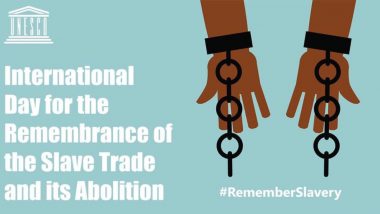Each year on August 23, the global fraternity celebrates the International Day for the Remembrance of the Slave Trade and its Abolition to commemorate the uprising that played in a vital role in the abolition of the transatlantic slave route. The day is worth remembering as the day of uprising against the transatlantic slave trade, which took place on the night of 22 to 23 August 1791, in Santo Domingo -- currently known as Haiti.
The UNESCO chose the date of August 23 to celebrate the International Day for the Remembrance of the Slave Trade and its Abolition at its 29th session of Organization's General Conference in 1998. It passed a resolution 29 C/40 via Circular CL/3494 of July 29, 1998, to promote this day. The International Day was first celebrated in several countries, in particular in Haiti on August 23, 1998, and Senegal on August 23, 1999. Following this, the International Day for the Remembrance of the Slave Trade and its Abolition was celebrated in France's Mulhouse in 2001 and United Kingdom's Liverpool in 1999. Emancipation Day in Jamaica 2020: Know History, Significance of the Day That Marks the End of Slavery in the British Empire.
According to the United Nations, the international day is intended to inscribe the tragedy of the slave trade in the memory of all peoples. The aim behind celebrating the international day is to offer an opportunity for collective consideration of the historic causes, the methods and the consequences of this tragedy -- that took place in 1791. Also, this offers people an opportunity to analyse the series of interactions which gained momentum between Africa, Europe, the Americas and the Caribbean.
Recently, an African-American person -- George Floyd -- died in Minneapolis on May 25 when a white police officer pinned him to the ground and knelt on his neck while the 46-year-old gasped for breath. Following his death, nationwide violent protests erupted which left a trail of destruction. Even campaign like 'Black Lives Matter' began in the United States, which spread to all across the globe. Violent protests were seen on the streets of London too.
The International Day for the Remembrance of the Slave Trade and its Abolition is also celebrated to honour the memory of the men and women who, in Saint-Domingue in 1791, revolted and paved the way for the end of slavery and dehumanisation. On this day, UNESCO Member States organise events and invite participation from young people, educators, artists and intellectuals. During the events, the UNESCO -- though its Slave Route Project -- seeks to enhance the understanding of diverse histories and heritages stemming from this global tragedy.
(The above story first appeared on LatestLY on Aug 23, 2020 08:15 AM IST. For more news and updates on politics, world, sports, entertainment and lifestyle, log on to our website latestly.com).













 Quickly
Quickly


